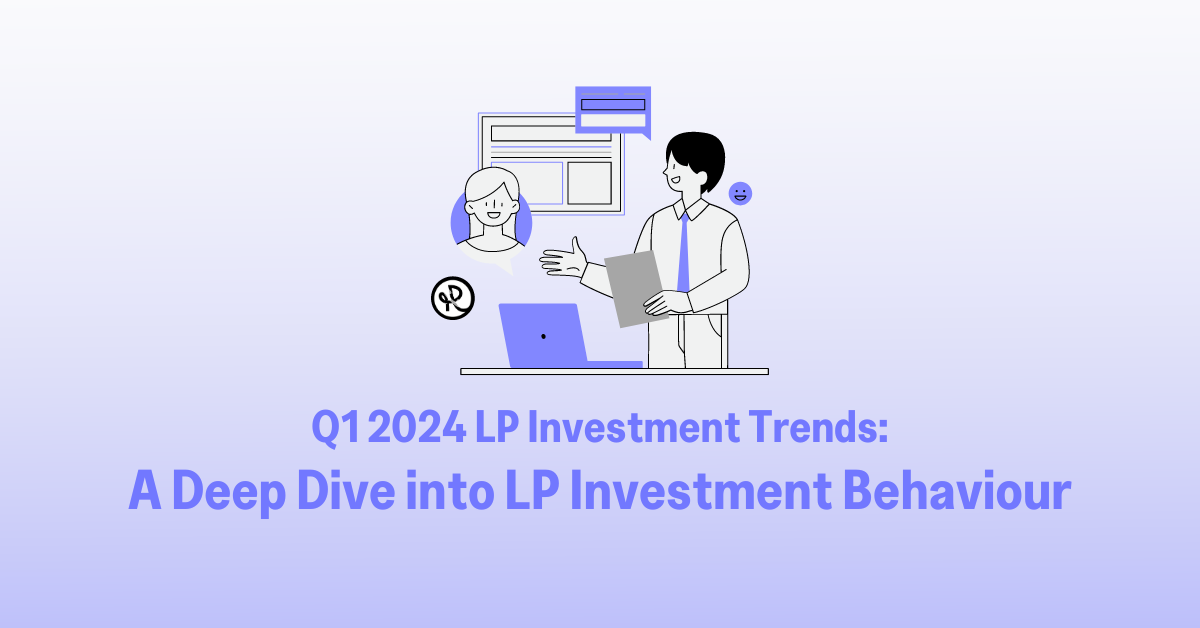
Table of Contents
LP Investment Trends in Q1 2024: A Deep Dive into LP Investment Behaviour
So the Q1 2024 numbers are out and there’s a lot to talk about regarding the European VC dynamics. But how about Limited Partners (LPs)? What are their sentiments and appetites? What are they investing in?
This portion of the investment landscape is often considered something close to a black box so we figured we could break it down.
Let’s dive right into the Q1 2024 LP Investment Trends!
First quarter of 2024 revealed a number of shifts and trends in the investment behaviours of LPs. As the venture capital ecosystem continues to adapt to global economic fluctuations, technological advancements, and shifting investor priorities, understanding these trends is crucial for both GPs and startups looking for funding.
Here, we briefly explore the investment patterns of LPs, including, Development Finance Institutions (DFIs), Family Offices, High Net-Worth Individuals (HNWIs), Pension Funds, Insurance Companies, and Sovereign Wealth Funds, providing insights into their strategic moves and potential impacts on the venture capital landscape.
DFIs have shown a strong inclination towards sustainability-driven ventures, aligning with global efforts to combat climate change and promote social good. In a trend that continues for several years now, DFI investments are increasingly directed towards projects that promote sustainability and energy efficiency, reflecting a strategic alignment with the European Union’s broader climate goals.
So far in 2024, there has been a noticeable uptick in investments in green tech and sustainable agriculture startups. DFIs have been crucial in supporting sectors like cleantech and renewable energy, with significant investments aimed at advancing Europe’s green transition. This trend underscores DFIs’ commitment to funding businesses that not only promise financial returns but also contribute positively to societal and environmental outcomes.
Technology has been the number one driver of investment for family offices throughout Q1, representing 43% of all tracked transactions during the quarter. This is rather a continuation of the previous years than a novelty.
However, there has been a significant interest in health tech and fintech sectors, now making up 24% of investments, up from 18% in Q3 2023.
Another trend is that investment in real estate and construction has declined, now only accounting for 5% of transactions, down from 12% in Q3 2023.
Additionally, family offices are increasingly co-investing with other investor types to diversify risks and leverage collective expertise.
Overall, these dynamics point to an investment strategy driven by their potential for long-term growth and resilience in the face of economic uncertainties. Family Offices are focusing on startups that offer innovative solutions while providing stable returns.
Another interesting dynamic in 2024 investment behaviour is the rising interest among high net worth individuals (HNWIs) towards ESG-compliant investments, reflecting a broader shift globally. According to Private Banker International, wealth managers are observing significant growth in the use of ESG-focused passive strategies.
This trend is driven by the increasing recognition that ESG investments are not merely a ‘nice to have’ but a critical component of a forward-thinking wealth management portfolio. A promising shift: It increasingly seems like wealthy investors are more and more conscious of the impact of their investment choices on the world.
Apart from ESG, commercial real estate remains a popular investment choice among HNWIs, particularly in the “living sectors,” which include residential and healthcare facilities. According to the Wealth Report, this sector tops the investor wish list for the first time in four years, capturing significant interest due to its robust rental growth prospects and counter-cyclical nature.
Pension Funds and Insurance Companies have continued their cautious approach to venture capital investment, focusing on sectors that offer stability and steady growth (i.e. sustainable agriculture, energy and utilities).
Several notable transactions during this quarter were in real estate (see the acquisition of 21,000 acres of prime farmland in the UK for £260m) and energy/utilities which saw the most capital inflow from pension funds during the first quarter, totalling $313.1 million.
Conversely to family offices, there was a marked decline in technology investments in 2024 suggesting a shift or re-balancing of investment strategies toward sectors perceived as offering more immediate stability or alignment with broader economic and environmental trends.
In 2024, Pension funds demonstrated a noticeable preference for investing in venture funds that specialise in late-stage startups, which present lower risks compared to early-stage investments.
In 2024, sovereign wealth funds (SWFs) and other sovereign investors (SOIs) reflect a cautious yet strategic approach in navigating the complex financial landscape of 2024.
There is a notable growth in private equity deal value, reflecting a 4% increase to $79.4b. Sovereign investors are increasingly engaging in mega-deals and forging alliances, and moving away from VC investments due to geopolitical and economic uncertainties. This shift from high-volume VC to more strategic, larger equity deals is also observed in their increasing average transaction value.
In terms of sectors, energy and natural resources are taking the lead. This is aligned with a growing emphasis on energy transition technologies such as new battery tech and low-carbon processes. Meanwhile, investments in the industrial and manufacturing sector also rose significantly, by 27% to US$ 24.9 billion, showcasing a strategic alignment towards durable and essential industries.
VC investments tell a more promising story than 2023 where the venture appetite had hit a long time low among SOIs. According to SWF 2024 Annual Report, there is renewed interest in investing in startups oriented towards AI, sustainability and the energy transition, particularly EV infrastructure and batteries.
The first quarter of 2024 has put a spotlight on the varied investment strategies and priorities of LPs as a part of the VC value chain.
Here’s a global summary of the trends:
This tapestry of LP behaviors underscores a lively and transforming landscape, where the interplay of global economic shifts, technological progress and market forces dictate the pace and direction of capital flow.
As VC firms and startups navigate this complex terrain, a more nuanced understanding of LP appetites will be helpful for unlocking funding opportunities and crafting valuable alliances.
Hale Yildiz is the Head of Business Development at Pitch Me First, where she leverages her experience gained in the EIF in the venture capital and private equity space. At Pitch Me First, she collaborates closely with Tulin (CEO and advisor) in guiding European VC/PE firms in enhancing their fundraising strategies driving innovative advisory and marketing solutions to help GPs achieve their funding goals.
Book a 30-minute discovery call with Pitch Me First to see how you can secure institutional money!

Are you looking for an efficient way to create and share LP reports with your Limited Partners? Book a call today and let’s get started!

Consolidate your portfolio and fund data in one single report.